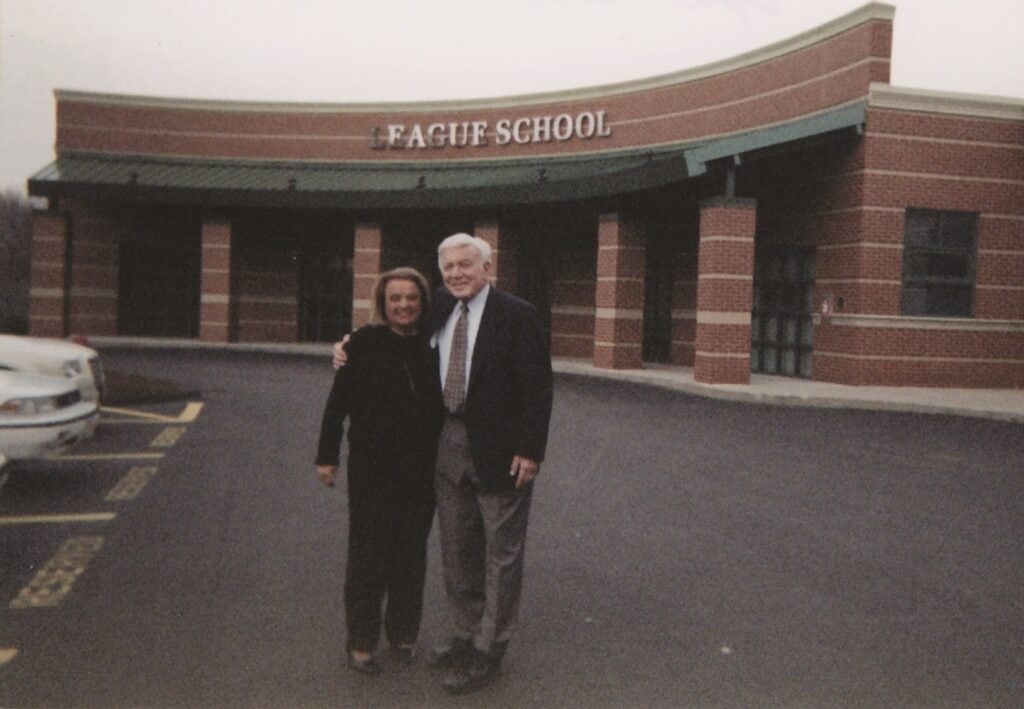
League School Mourns Loss of Co-Founder Arnold D. Vetstein, a Remarkable Leader in Autism Education
“Co-founding the League School has been one of the most meaningful experiences of my life.”
In the early 1960s, Arnold D. Vetstein, a dentist who lived in Newton and practiced in Framingham, and his wife, Leona, were concerned that their son (age 3) was exhibiting unusual behavior. They brought him to be evaluated at Massachusetts General Hospital, where he was diagnosed with autism. When they searched for education for their son, Richard, they discovered that public schools, including the highly regarded Newton Public Schools, did not have a legal commitment to educating students considered “seriously disturbed.”
This lack of education services became the impetus for co-founding the League School, and the Vetsteins’ work continues to this day.
“The League School has helped kids with autism flourish, and I can’t believe how far the school has come,” Dr. Vetstein expressed at the dedication of the school’s Vetstein Auditorium in 2012. “The League School has been one of the most meaningful experiences of my life,” he commented in 2015. Arnold Vetstein died on December 12, 2022, at the age of 96. His wife, Leona Fine Vetstein, predeceased him.
“Arnold Vetstein was justifiably proud of how the League School has evolved in the 56 years since he co-founded it,” League School Board of Directors Chairman Roger A. Lockwood said. “Arnold’s passion inspired many of us to serve at League on behalf of the autism community. We mourn his loss but celebrate his life, which has benefited so many children and families. It is our mandate to remain committed to excellence in autism education for years to come.”
Educational opportunities for students with autism were limited and disjointed in the 1960s
At the time the League School was founded, the prevailing concept for treating children with autism was based on the belief that they were the products of cold, “refrigerated mothers.” The mother could never talk directly to the psychiatrist. If there were behavioral issues – and there were always problems managing these children because they were unmanageable – the mother had to discuss them with the social worker, who would in turn discuss them with the psychiatrist for solutions. It was not until the next week’s visit that the mother received answers, at which time she had yet another set of problems to resolve.
The prevailing concept for teaching these children was the “holy trinity” of the psychiatrist, psychologist, and social worker, who would provide disjointed individual therapy for a few hours each week.
“It was an environment where support and education were limited and lacking,” said Nancy Hershfield, the Vetsteins’ daughter, and League School Board member. “My brother, Rick, spent three years in either inadequate or inappropriate schools until my parents decided they needed to explore creating a school on their own dedicated to educating those with autism. They worked with Dr. and Mrs. Morton Olin, who had an autistic son, and eventually took the lead in founding a school based on a collaborative, sustained model of educators who understood autism and believed that these children have the potential to succeed.”
After a lot of calls, letters, and research, Mrs. Vetstein traveled to New York to meet with Dr. Carl Fenichel, founder, and director of the League School of Brooklyn, who believed in employing trained special education teachers to address autistic behaviors. The Vetsteins were enthusiastic about the model. Dr. Fenichel provided invaluable advice, and graciously allowed the use of the League School name for the new school.
Thanks to the dedicated efforts of the Vetsteins, the expertise of leaders in the mental health and psychiatric fields, and a grant from the Committee for the Permanent Charity Fund, the League School of Greater Boston opened its doors on November 7, 1966. The two Newton classrooms were staffed by a director, a teacher, and a part-time social worker. The school changed locations in Newton several times over 30 years, and in 1999 moved to its current Walpole campus.
Laws improve access to special education as need skyrockets
When the Vetsteins’ son was turned away from the public schools, there was no available legal recourse. That changed in the early 1970s when the Bartley-Daly Act, which later became Massachusetts Special Education Law Chapter 766, was signed into law. This law requires the state’s school districts to provide all eligible children with disabilities a free and appropriate public education. When children with autism don’t thrive within an integrated public school classroom, the school district can pay for the student to attend a special education school like the League School. Legislation requiring public schools to offer to all eligible children with disabilities a free and appropriate public education for students with disabilities became federal law in 1973.
Legal relief is critical as the need for autism education skyrockets. The most recent Centers for Disease Control statistics estimate that 1 in 44 children have been identified with autism spectrum disorder (ASD). This rate is up significantly from 2000 when 1 in 150 children was diagnosed with ASD.
Students with autism have flourished and will continue to do so thanks to the Vetsteins’ legacy

The League School’s Vetstein Auditorium was dedicated in 2012.
Today the League School serves nearly 100 students, offering a robust multi-disciplinary approach to autism education to both day and residential students, and is on a trajectory for additional growth.
“When planning the school, we had hoped it would be a place that would be parent-friendly, provide education and training for autistic children, and be a place where candidates for degrees in special education could come for training,” said Dr. Vetstein at the school’s 45th anniversary. After outlining the progress of the school over the years, he told the staff that they were a “dream come true.”
“It is the everyday efforts of the community – the staff, teachers, local partners, school districts, donors, parents, and especially the students – who will continue my dad’s and mom’s dream and vision to create a place where people with autism and their families can feel happy and fulfilled,” Ms. Hershfield said.
“The League School owes its very existence to Dr. Vetstein,” League School Chief Executive Officer Lawrence E. Sauer said. “We carry on his vision every day to provide our neurodiverse students with the best possible education.”
The Vetsteins’ legacy will live on not only through the school, but also through the annual award given in their name. The Vetstein Award recognizes individuals who demonstrate a commitment to helping students with autism live to their fullest potential. “This award truly commemorates my parents’ tenacity and their belief that it takes a community to make a difference in the lives of those touched by autism,” Ms. Hershfield added.
“I didn’t know that I was going to be born with a learning problem, but it’s one of those things that you have no control over,” said Rick Vetstein, who was the inspiration for the school. “My parents developed the school to help me and other kids with autism, and my mom and dad did a great job.”
Arnold and Leona Vetstein were proud of their son’s achievements, especially his ability to live independently. Dr. Vetstein called Rick “our success story.” Through their vision, efforts, and commitment to founding one of the first schools in New England serving those with autism, the Vetsteins have helped hundreds of students thrive. And as the League School of Greater Boston continues to be an award-winning educational facility, the Vetsteins’ legacy and impact will live on to help create even more success stories.
Donations in appreciation and memory of Arnold and Leona Vetstein can be made to the League School of Greater Boston, 300 Boston-Providence Turnpike, East Walpole, MA 02032, or on our website.
